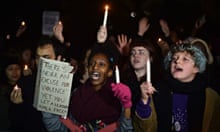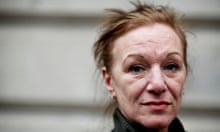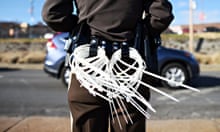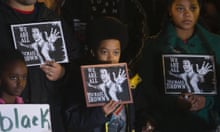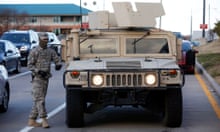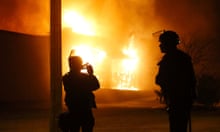The police officer who shot dead an unarmed black 18-year-old in Ferguson, Missouri, leading to weeks of unrest and reviving a national debate about law enforcement and race in America, will not face state criminal charges, it was announced on Monday.
A grand jury in St Louis County declined to indict Darren Wilson for killing Michael Brown on 9 August, following an altercation after the officer stopped him and a friend for jaywalking. Wilson is also under investigation by federal authorities, which could bring civil rights charges.
There were multiple reports of looting in Ferguson after the announcement by St Louis County prosecuting attorney Bob McCulloch, and windows were broken at shops near the Ferguson police department.
A series of witnesses had claimed Brown was shot after fleeing Wilson and raising his hands in an apparent surrender. But in announcing the decision, McCulloch said some of those witnesses had recanted while others admitted not seeing the shooting.
“I’m ever mindful that this decision will not be accepted by some,” McCulloch said at a press conference in Clayton. “It may cause disappointment for others. But all decisions in the criminal justice system must be determined by the physical and scientific evidence, and credible testimony corroborated by that evidence. Not in response to public outcry, or for political expediency.”
Speaking moments after McCulloch finished, Barack Obama urged protestors to seek “constructive” outlets for their anger as his appeal for calm from the White House briefing room failed to quell growing violence on the streets of Ferguson.
“There is undoubtedly going to be some form of negative reaction and it will make for good TV,” said the president, warning that “throwing bottles or smashing cars” will not solve the underlying mistrust and genuine problems still facing African Americans.
As he has throughout, Obama refused to comment on the specifics of the case, saying all Americans should recognise the decision not to indict Darren Wilson.
“We are a nation based on the rule of law so we need to accept that this was the special jury’s decision to make,” he said.
But the president also said there were legitimate grounds for mistrust of police more generally and argued it would be wrong to try to “tamp this down” or “paper it over”.
“This is not just an issue for Ferguson; this is an issue for America. We have made enormous progress in race relations over the course of the past several decades – I have witnessed that in my own life – and to deny that progress is to deny America’s capacity for change,” he said. “But what is also true is that there are still problems and that communities of colour are not making these problems up.”
As he spoke, protests has already broken out in Ferguson and elsewhere. In New York, hundreds of people gathered in Union Square and Times Square before marching uptown.
In Ferguson, a Walgreens pharmacy was seen in flames, and people were seen entering other stores – a beauty supply shop and a nail salon among them. The Associated Press reported that a Little Caesar’s pizza shop and a storage unit were among the buildings that burned.
Walgreens on fire and people are rushing in before it burns down to loot more goods. #Ferguson pic.twitter.com/OrcjYDwA1t
— Paul Lewis (@PaulLewis) November 25, 2014
In Oakland, California, dozens of people blocked traffic on Interstate 580, while the Associated Press reported largely peaceful protests in Chicago, Los Angeles and New York.
The grand jurors had been asked to decide whether there was probable cause to charge Wilson with any of five crimes ranging from involuntary manslaughter to first-degree murder. McCulloch declined to say whether the decision was unanimous. Nine out of 12 votes had been needed for an indictment.
Autopsies by the county and Brown’s family found that he was shot by Wilson at least six times, including twice to the head. McCulloch disclosed on Monday that Wilson’s gun was fired 12 times in the course of the encounter. The prosecutor said that the struggle ensued after Wilson realised that Brown matched a description broadcast over police radio moments earlier for a grocery store robber.
Brown’s family said in a statement: “We are profoundly disappointed that the killer of our child will not face the consequence of his actions.” They called for peaceful demonstrations over the decision, saying that “answering violence with violence is not the appropriate action”. They said: “We ask that you channel your frustration in ways that will make a positive change.”
The entire St Louis region was immediately braced for protests over the grand jury’s decision. Brown’s death was followed by successive nights of intense clashes between police and protesters. Some businesses closed while some school districts cancelled classes for the week.
It had been widely anticipated in Ferguson that Wilson would not be indicted. Many of those involved in demonstrations accuse white authority figures in the city, whose population is two-thirds black, of covering up the truth about the killing of Brown by Wilson, 28, who is white.
Residents said that Brown’s shooting caused the boiling over of long-simmering discontent between Ferguson’s majority-black population and the 94% white police force. Many accused McCulloch, whose father was a white police officer killed by a black man, of a pro-police bias and called for his recusal from the case.
Officials and police around St Louis have been making extensive preparations for renewed protests and more than a dozen arrests were made in the past week. James Knowles, Ferguson’s mayor, said this month that they would “prepare for the worst”. He told a local television station: “There are expectations that demonstrations probably will break out in several places.”
McCulloch pre-emptively defended the grand jury from inevitable attacks they will receive from supporters of Brown’s family. “They are the only people who have heard and examined every witness and every piece of evidence.”
Missouri law states that an officer may shoot someone who is reasonably feared to pose an imminent threat of death or serious injury to the officer or another person. Courts have ruled that officers may also shoot to stop someone suspected of a killing or grievous injury from fleeing if they pose others a serious threat.
Wilson chose to testify before the jury for more than four hours. He told jurors that Brown assaulted him in his patrol car and that the pair struggled over his pistol. McCulloch said that several witnesses had testified that after fleeing, Brown turned and advanced on the officer. He said that there was disagreement about where Brown’s hands were when he was shot.
While some did they say they saw Brown raise his hands in the air, McCulloch said, “several witnesses said that Mr Brown did not raise his arms at all, or raised them briefly”.
In a long and at times angry statement, McCulloch sharply criticised people in the region and on social media for spreading a version of the shooting that he said had been disproved by physical evidence and a series other eyewitnesses. Some African American witnesses testified that they saw Brown charging or moving towards Wilson before the 18-year-old was shot dead, he said.
Dorian Johnson, a friend who was with Brown at the time, has said repeatedly that Wilson simply reacted aggressively when the pair declined to comply with the officer’s request for them to move from the middle of the road to the sidewalk on Canfield Drive.
Johnson told reporters that Wilson grabbed Brown by the neck and shot the 18-year-old as he escaped the struggle. Several other witnesses, including two workmen cutting nearby trees at the time, have agreed that Brown appeared to be surrendering when he was shot dead.
McCulloch also attacked the “insatiable” appetite of the news media, accusing the industry of hindering the grand jury process. The grand jury of seven men and five women met on 25 days over three months, he said. Nine of them were white and three were black. McCulloch said they heard more than 70 hours of testimony from more than 60 witnesses and watched “hours and hours” of interviews witnesses gave to police and the media.
Evidence was presented to the jury by two assistant prosecutors, Kathi Alizadeh and Sheila Whirley. McCulloch pledged that all material from the case would be published if Wilson were not indicted. His office immediately made public some documents and testimony.
The jury had already been impanelled to hear other cases in the county when Brown was shot dead. Paying tribute to the jurors’ service, he said: “These grand jurors poured their hearts and souls into this,” adding that they “gave up their lives, put their lives on hold, put their families on hold, put everything on hold so they could come in and do their civic duty”.
Asked for his message to the Brown family, McCulloch said: “My heart goes out to them. Regardless of the circumstances, they lost a young man, they lost a young life.” He added: “No young man should ever be killed by a police officer, but no police officer should ever be put in that position.”
